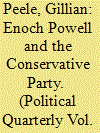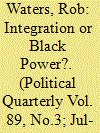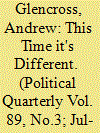|
|
|
Sort Order |
|
|
|
Items / Page
|
|
|
|
|
|
|
| Srl | Item |
| 1 |
ID:
161687


|
|
|
|
|
| Summary/Abstract |
The article examines the process whereby government and business elites have driven the expansion of London airports, particularly via the mode of the establishment of an ‘independent’ commission, the Davies Commission (2012–2015). It addresses the strategic framing of airports planning, including the role of National Policy Statements, and the nature of the consideration of the planning applications for consent to develop. Temporal and geographical dimensions are analysed, showing how central to the UK state project is the expansion of the southern English / Greater London core, with associated infrastructure geographies. It concludes that corporate and state power may well achieve the desired expansion of airport capacity in the London region, overriding environmental and other non‐commercial considerations. However, there are tensions in the dominant state and business model, given an apparent commitment to carbon emissions reduction and other air quality goals, as well as to minimising the costs to the public sector which airport expansion is likely to generate.
|
|
|
|
|
|
|
|
|
|
|
|
|
|
|
|
| 2 |
ID:
161686


|
|
|
|
|
| Summary/Abstract |
This article assesses the character, role and outcomes of the Airports Commission. Analysing its workings from September 2012, it evaluates the final recommendations and then charts their subsequent public reception. The article claims that the Airports Commission's endeavours to depoliticise aviation by using ‘reasonable’ methods and impartial judgements—often embodied in Howard Davies himself—have been met with local resistance and political opposition, focussed on the proposal to expand either Heathrow or Gatwick. It exposes how the recourse to expert commissions offers only temporary respite for government responsibility and accountability in the making of hard decisions. It concludes that the inability to secure a binding and acceptable agreement does not just reside at the door of the Airports Commission, but rests also on the failures of political leadership and the ‘missed opportunity’ to articulate a sustainable vision for aviation after the 2010 moratorium on airport expansion in the south‐east of England.
|
|
|
|
|
|
|
|
|
|
|
|
|
|
|
|
| 3 |
ID:
161693


|
|
|
| 4 |
ID:
161689


|
|
|
|
|
| Summary/Abstract |
This article explores the 2011 Fixed‐term Parliaments Act's less‐obvious implications. First, it discusses why Theresa May found calling the 2017 election so straightforward, and notes what this implies for how FTPA works. Second, it looks at executive–legislative relations. FTPA removed the government's ability to designate controversial parliamentary votes as matters of confidence, and introduced a fourteen‐day cushion between a no‐confidence vote and Parliament's dissolution. In the process, it shifted the balance of power from ministers to backbenchers, to an extent potentially greater than most observers recognise. Third, it considers the more outlandish possibilities raised by FTPA's imposition of a fourteen‐day waiting period after a government's defeat on a no‐confidence motion before a new election can be called. It is possible, for example, for rebel MPs from the governing party to use the no‐confidence procedure to force concessions from the cabinet. Finally, it assesses FTPA's long‐term survival prospects, and what repeal would involve.
|
|
|
|
|
|
|
|
|
|
|
|
|
|
|
|
| 5 |
ID:
161684


|
|
|
|
|
| Summary/Abstract |
CONFLATION IS a tool commonly used by the media these days: the merging of two separate pieces of information, often to create a negative story, where previously none existed. On that premise, one could be forgiven for thinking that an invitation to comment on changes in Conservative party attitudes to race and ethnicity in the fifty years since Enoch Powell's Birmingham speech, suggests that Powell was the voice of the Tories at the time. The fact that his speech resulted in a unanimously supported summary dismissal from the Shadow Cabinet strongly indicates that Powell's lines on immigration were very much his own and not a mainstream view. I suggest, therefore, that the Birmingham speech is not so much a Conservative party political milestone, but more of a deeply regrettable moment in Powell's personal political life.
|
|
|
|
|
|
|
|
|
|
|
|
|
|
|
|
| 6 |
ID:
161675


|
|
|
|
|
| Summary/Abstract |
when my father was advising Enoch Powell on how to gain maximum press and television coverage for his speeches, he could scarcely have imagined that decades later two equally resourceful politicians, Nigel Farage and Donald Trump, would similarly break new ground in their manipulation of the news media when exploiting fears over uncontrolled immigration. In the 1950s, the newly‐elected Conservative MP for Wolverhampton South West, and Clement Jones, a journalist on the Wolverhampton Express and Star, were both on a fast track to promotion—Powell to become a Cabinet minister, and my father to the editor's chair of his local evening newspaper. The 1968 ‘Rivers of Blood’ speech triggered a traumatic episode for the Jones household, the end of a close family friendship; a moment of great sadness for my mother; and a damaging blow to my father's career.
|
|
|
|
|
|
|
|
|
|
|
|
|
|
|
|
| 7 |
ID:
161678


|
|
|
|
|
| Summary/Abstract |
This article examines Enoch Powell's ‘Rivers of Blood’ speech in relation to the Conservative party. Powell's speech created an additional challenge to a Conservative party already weakened by the loss of the 1964 and 1966 elections and by the failure of the newly elected leader, Edward Heath, to impress his authority decisively on the party. Powell had some parliamentary support but his real following was concentrated in the Conservative grass roots. Powell lost the support of the liberal‐minded Shadow Cabinet; but after 1968 the Conservatives nevertheless moved to the right on the issue, especially after Mrs. Thatcher became leader in 1975. His speech has cast a long shadow as the party has sought to modernise in more recent times and to appeal to a more racially diverse electorate.
|
|
|
|
|
|
|
|
|
|
|
|
|
|
|
|
| 8 |
ID:
161680


|
|
|
|
|
| Summary/Abstract |
This article explores popular reactions to Enoch Powell's speech in Birmingham on 20 April 1968. It describes the protests by sympathetic workers, such as the Smithfield meat porters, and the responses of the press, both nationally and in the West Midlands. It considers the speech's impact on immigrants themselves and it makes the case that Powell's real significance was as an early champion of a particular kind of anti‐Establishment populism, which has now become a very familiar feature of our political landscape.
|
|
|
|
|
|
|
|
|
|
|
|
|
|
|
|
| 9 |
ID:
161674


|
|
|
|
|
| Summary/Abstract |
Fifty years ago, Enoch Powell made what still is one of the most notorious speeches in postwar British politics. Its tone was shocking for its use of inflammatory references to ethnic minority immigrants. Immigration continues to be divisive and references to it by politicians inevitably lead to comparisons with Powell. The aim of the collection is to examine Powell's speech from a number of perspectives, exploring how it was viewed both by contemporaries and in the light of subsequent developments. The objective of this article is to examine Powell's motivations, impact and legacy.
|
|
|
|
|
|
|
|
|
|
|
|
|
|
|
|
| 10 |
ID:
161690


|
|
|
|
|
| Summary/Abstract |
A recent change to the Labour party's nomination rules for leadership elections was the eighth such major modification of this brief clause in the party's rule book since 1981. These changes have provided a barometer of factional conflict over this period and indicate the importance of gate‐keeping powers in leadership selection. This article recounts the history of these eight rule changes. It shows how the proportion of Labour MPs (and later MEPs) required to nominate candidates in leadership elections has oscillated markedly, as the left has tried to reduce it while centrists have sought to increase it. The most recent change in 2017, when the threshold was decreased to 10 per cent of Labour MPs and MEPs, was a victory for the left. The article argues that the changes to Labour's nomination rules, while lower‐key than the extension of voting rights from MPs to ordinary members, have been just as significant.
|
|
|
|
|
|
|
|
|
|
|
|
|
|
|
|
| 11 |
ID:
161673


|
|
|
|
|
| Summary/Abstract |
On 27 April1968, Richard Crossman reflected in his diary on Enoch Powell's ‘Rivers of Blood’ speech. Powell had delivered the speech a week earlier in a bid to bypass elite opinion on immigration by mobilising the public against Britain's nascent multiculturalism. Although worried by the support Powell had attracted, Crossman thought that in the last resort the British political system had crucial safeguards against the corrosive effects of such uninhibited populism:
|
|
|
|
|
|
|
|
|
|
|
|
|
|
|
|
| 12 |
ID:
161682


|
|
|
|
|
| Summary/Abstract |
Integration politics experienced a postcolonial crisis in the late 1960s. This was a crisis driven by the simultaneous and inter‐related eruption of Powellism and Black Power. This article uses the crisis of integration politics to show the Powellite conjuncture from its other side, as it played out in the reconstitution of black British politics. It shows how black activists responded to the rise of Powellism by demanding that the politics of integration be either abandoned or reframed, to more fully shake out the colonial inheritances that lurked within it. The integration proposed by the postwar project of race relations was problematic from its inception; Black Power used Powell's intervention to expose these problems and demand change.
|
|
|
|
|
|
|
|
|
|
|
|
|
|
|
|
| 13 |
ID:
161677


|
|
|
|
|
| Summary/Abstract |
In his ‘Rivers of Blood’ speech, and in several speeches in subsequent years, Enoch Powell claimed that immigration was an ‘issue of numbers’. Britain could not, he believed, accommodate a significant number of non‐white people without threatening the existence of the nation. I argue that Powell's opposition to immigration, and his numerical framing of it, rested upon his racialised conception of British, or English, nationhood. As he was shunned by political elites, Powell articulated an increasingly populist nationalism. Drawing repeated references to Britain's wartime experiences, Powell claimed that the British, or more often the English, were being attacked by an immigrant enemy without, and betrayed by an establishment enemy within. I conclude with some reflections on the similarities between Powellite nationalism and contemporary discourses about national identity during and since the European Union referendum.
|
|
|
|
|
|
|
|
|
|
|
|
|
|
|
|
| 14 |
ID:
161688


|
|
|
|
|
| Summary/Abstract |
This paper critically examines recent responses by and interactions between stakeholders in negotiating the acceptability of aircraft noise standards in Australia in order to help inform debate in Britain. It investigates the interplay of the politics of noise with the broader land use planning context focusing on the role of government, airports, community interests, and the development sector. Different local environments inevitably frame diverse contexts, but the pervasive challenge is in securing the acceptable trade‐off between the economic dividends promised by airports and local quality of life. Discussion is structured around four main issues: an introduction to the Australian politics of airport noise, an historical timeline of key contextual events, identification of the major actors in the noise governance framework, and a focus on an issue of increasing political significance, namely the different positions of airports and developers in the increasing intensification of urban development.
|
|
|
|
|
|
|
|
|
|
|
|
|
|
|
|
| 15 |
ID:
161691


|
|
|
|
|
| Summary/Abstract |
Decent labour standards are a prerequisite for perceived justice and social cohesion. Insofar as they have been achieved in Britain in the past, it has been the result of collective bargaining between employers and trade unions. This has all but vanished in the private sector and, it is argued, there is no chance of its being revived. Upholding labour standards now lies in the provision of statutory individual employment rights. Experience with minimum wages provides some guidance on how these might be developed through social partnership arrangements. Once achieved, such rights amount to little without effective enforcement. Increasingly important for this is the use of the law and consumer campaigns to expose poor employment practices and complex supply chains so that offending employers can be held to account. If Britain is to avoid falling into a competitive ‘race to the bottom’ with Brexit, it must institute a robust means of implementing and enforcing decent labour standards.
|
|
|
|
|
|
|
|
|
|
|
|
|
|
|
|
| 16 |
ID:
161683


|
|
|
|
|
| Summary/Abstract |
Enoch Powell's infamous speech casts a long shadow over race equality in the UK. Looking back to the 1968 Race Relations Bill and then forwards to the present social and political landscape this article explores how an uneven race equality story has been characteristic of the UK approach since Powell's intervention. If the intended objective of the initial and later race equality bills was to reduce ethnic and racial disparities to a marginal or ‘negligible’ level, then we are a great distance from success. If the objective was slightly different, but not unrelated, and sought to reshape public conventions on racism (and ethnic and racial diversity more broadly), then the answer is more complicated but also unfinished.
|
|
|
|
|
|
|
|
|
|
|
|
|
|
|
|
| 17 |
ID:
161679


|
|
|
|
|
| Summary/Abstract |
This article examines the impact of Enoch Powell's speech on Britain's numerous right‐wing fringe groups and their response—in particular, that of the National Front, who benefitted the most from Powell's intervention on race and for a brief moment became Britain's fourth political party. It begins by looking at the growth of post‐World War II British fascism and how its emphasis switched from anti‐Semitism to anti‐colonial immigration. Throughout the piece, the relationship between Britain's far right and the Conservative party is examined to show how Powell inadvertently blurred the lines between the two. The article concludes with the 1979 general election victory of Margaret Thatcher who, by adopting Powellite themes but in more measured tones, destroyed the National Front's dream of an electoral breakthrough.
|
|
|
|
|
|
|
|
|
|
|
|
|
|
|
|
| 18 |
ID:
161685


|
|
|
|
|
| Summary/Abstract |
Aviation expansion and the construction of a third runway at Heathrow airport is firmly back on the political agenda. Yet, the stark fact remains that a growing list of British governments has been unable to engineer a partial or temporary policy settlement in aviation. In exploring the challenges of reaching such a settlement, this article characterises the shifting and contested political and policy contexts of UK aviation. It begins by exploring the ‘wicked issue’ of aviation expansion before foregrounding how the politics of air travel is riven by competing policy frames, fragmented governance and the absence of gatekeepers. It argues that the Davies Commission and its efforts to remove aviation from the domain of partisan politics provided little more than a temporary respite for government. It thus concludes by questioning whether the May government's expansion proposals will succeed this time around, outlining how the contributions in this collection address the themes and issues of this overriding policy puzzle.
|
|
|
|
|
|
|
|
|
|
|
|
|
|
|
|
| 19 |
ID:
161676


|
|
|
|
|
| Summary/Abstract |
This article treats Enoch Powell's ‘Rivers of Blood’ speech as an example of the epideictic rhetoric of blame and exclusion. Drawing on a framework proposed by Celeste Michelle Condit, the analysis explores the functions of the address for the speaker and for the audience. Of particular concern are Powell's self‐presentation as a statesman and prophet; his account of the impact and consequences of unrestricted immigration; and his portrayal of a community where ordinary, decent English people were being displaced and victimised by Commonwealth immigrants—a process in which he claimed the authorities were complicit. For the audience, the speech gave public expression to their concerns about immigration, though Powell's predictions of a dystopian future also aroused sentiments of anger and foreboding. Despite the controversy that ensued, the impact of ‘Rivers of Blood’ was far‐reaching, and its influence is still apparent in contemporary debates over immigration.
|
|
|
|
|
|
|
|
|
|
|
|
|
|
|
|
| 20 |
ID:
161692


|
|
|
|
|
| Summary/Abstract |
British political debate since the EU referendum has hinged on what type of Brexit to pursue: hard or soft. Yet, unlike in instances of treaty rejection, the EU made no counter offer to avoid a breakdown in relations that would follow the hardest of exits. This remarkable unity in not discounting the possibility of a hard Brexit demonstrates that UK withdrawal is very distinct from previous wrangles over EU reform. Drawing on the work of Kissinger, this article argues Brexit is a revolutionary act that denies the legitimacy of the EU order. Hence this process does not conform to other episodes of differentiation. When Westminster sought opt‐outs, it did not reject the core principles of integration. By not seeking to oppose a hard Brexit, Brussels has forced the UK government to find a new legitimising principle to govern EU–UK relations, transferring the burden of adjustment to London.
|
|
|
|
|
|
|
|
|
|
|
|
|
|
|
|
|
|
|
|
|